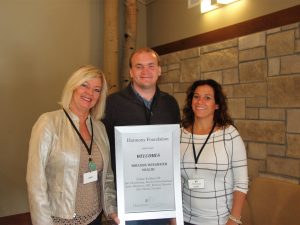News
Webinar Series: Failure to Launch

Presented by: Elizabeth Olson, Psy.D., LCSW
In this webinar, Dr. Olson will review common causes that contribute to the difficulties that some young adults experience launching into independence. Young adults encounter many challenges that interfere with their ability to launch into academic studies, career pursuits, and independent living skills. Effective strategies for parents will be discussed to assist parents in developing healthy boundaries, encouraging young adults to find their voice and follow their interests, and exploring how to let young adults fail forward. Parents are charged with the delicate task of relationally guiding their young adults while allowing them to become their own person, independent of the family. Unconscious parental motivations that tacitly interfere with the ability to launch will be explored. Aspects of the young adult brain are important to consider in order to understand how best to intervene. Parents will come away from this course with a better understanding of how to parent a youth who is struggling to launch and how to encourage the successful launch of kids who have yet to encounter this important developmental milestone.
WHEN: November 15, 2017 12:00pm – 1:00p
COST: Free
1.0 CEU pending
REGISTER HERE
Sobriety 1st
Sobriety 1st provides day treatment, IOP, and RP/GOP to individuals who require a high level of therapeutic structure and accountability.
Nicoletti-Flater Associates
Nicoletti-Flater Associates specialize in police and public safety psychology, crisis intervention, trauma recovery, and violence prevention.
Boulder County AIDS Project
Boulder County AIDS Project provides support and education to those in the community who live with or are affected by HIV. Learn more about their Mission.
Animal Assisted Therapy with Alyssa Overton
Continuing Care after Treatment: How to Keep Recovery Moving Forward

Addressing long term recovery often takes more than one episode of primary residential treatment. While the purpose of residential treatment is to provide a safe, structured living environment to help an individual stabilize, detox from drugs and alcohol and begin the early healthy coping skills necessary to help them on their journey to sobriety, it is just the beginning. A good in-patient residential treatment program does not stop once the client completes 28-30 days of treatment. The introduction of a strong continuing care plan should begin once the client completes detox before they exit in-patient treatment.
What is a continuing care plan? A continuing care plan is a collaborative partnership between a clinical case manager, the client and the therapist to design an individualized plan that provides a safety net of resources to continue their addiction treatment work. This could include Partial Hospitalization, Intensive Outpatient and active 12- step programming and sometimes sober living.
Why is continued “step –down” treatment important for long-term sobriety? According to NIDA, relapse is common in addiction treatment, with relapse rates being between 40 and 60 percent. Preventing relapse must include a continuing care plan that supports the individual in their early recovery. The Journal of Psychiatry published a 2014 review article, “The Continuing Care Model of Substance Use Treatment: What Works, and When Is “Enough,” “Enough?” Findings suggest that the overarching objective of any continuing care model should be to sustain treatment gains attained in the primary phase in an effort to ultimately prevent relapse.
In addition to our early primary addiction treatment offered at Harmony Foundation, we have also included a clinical case management team trained to work in partnership with the client and therapists to identify the “right” plan for each person. With over 47 years of treating individuals with substance use disorders, we have fostered partnerships with external providers to help our alumni be successful. “The most critical aspect of building a continuing care plan with our clients is letting them drive their recovery planning process. Telling them what to do and where to go doesn’t allow them to embrace their recovery.” says Alyssa Hansen, Director of Clinical Case Management.
Fostering this partnership and building a continuing care plan has shown positive results. According to M. Vannicelli , overall, continuing care participation in the first 3 months following discharge from residential treatment appears to be significantly related to fewer days since last drink and lower levels of alcohol-related impairment at both 3 and 6 months. Harmony has seen its own positive results in post-treatment engagement with over 54% of clients staying connected to a continuing care plan after 12 months.
When exploring residential treatment, asking about continuing care is as important as learning about the detox process. Without a solid, compassionate and collaborative continuing care team working with the client to approach life outside of residential team, clients may not be sufficiently prepared for their early journey of sobriety.
To learn more about Harmony Foundation Clinical Case Management, Click Here to listen to the team talk more about their important work in facilitating a recovery direction that is designed to be supportive and engaging, helping clients succeed.
Harmony’s Clinical Case Management Team
Boulder Integrated Health
Learn more about Boulder Integrated Health and the Detox services they will be offering to Boulder and the surrounding areas beginning October 9,2017

Harmony Foundation Podcast Interview with John Stenzel, CEO of A Healing Place – The Estates
Gina Thorne: Hi everyone. Welcome to the Harmony Foundation Podcast Series. I’m pleased to be joined by John Stenzel, CEO of A Healing Place – The Estates in … Remind me what place in California you guys are located?
John Stenzel: Ventura County, just south of Santa Barbara.
Gina Thorne: Wonderful to have you here.
John Stenzel: Thank you.
Gina Thorne: Really glad that you came up to visit with us today at Harmony. We want to hear more about what you do, and what A Healing Place is about, but before we do that, we want to hear a little bit more about your background, and what got you into the field of addiction treatment.
John Stenzel: Great. Thank you. I’ve been in health care nearly 40 years. I spent 11 years in physical and occupational rehab side, and working with paraplegics, quadriplegics, et cetera. After doing that for 11 years, it got me interested in the field of psychiatry, and then addiction medicine, and then behavioral health.
Gina Thorne: And you ran a couple of programs, I think, right?
John Stenzel: I had several programs. I had an adolescent residential program, I had a silver living business program, I had an international psychiatric services company, and had a very large behavioral group practice in LA. Now, I’ve transitioned into A Healing Place – The Estates.
Gina Thorne: Which is a very great way for us to segue into hearing more about this unique program that you have created with a couple of wonderful people. It really is a program that, based on my conversations with you all, is transforming the epidemic of chronic pain in our country. It’s one of those things that’s on the forefront of everyone’s mind in the field of addiction treatment, but not really familiar with how to treat it. It sounds like you are really working on creating a unique model to do that.
John Stenzel: Well, we are. I’ve partnered up with two industry professionals, Dr. Joe Cabaret is our chief medical officer and co-founder. He’s triple boarded, anesthesiology, pain, and addiction. Our other partner, chief clinical officer Dr. Stephen Grinstead, and he’s worked in the field for about 35 years, and he created the addiction free pain management evidence based treatment system, and that has become the foundation for our program.
Gina Thorne: Wonderful. Can you talk with me for a few minutes about what a client would experience if they were coming into your program, who has had a long-standing experience of chronic pain? What would they expect coming into the Healing Place?
John Stenzel: Because of the specialty program that we’ve developed, it’s a triple diagnosis program, so everyone has to have chronic pain that comes into the program, and 95% of everybody that is suffering from chronic pain will have psychological disorders and/or addictive disorders, because of the opiate epidemic, et cetera. The program is unique in that we are a closed program. We don’t allow any more than six patients at a time. It’s a closed cohort, and every level of care is for six weeks. The patients that are coming in, they’ve been suffering from chronic pain for years if not decades, so they need to be medically stabilized, detoxed, psychiatrically stabilized, and motivated to want to work the program. It’s quite unique. We start a new program every six weeks. All levels of care are six weeks in duration. We’re dealing with very, very complex issues, physical, sometimes failed operations, injuries, workers comp patients, those kinds of things, so they’re very complex and we offer medical services, psychiatric services, psychological services, and obviously addictive services.
Gina Thorne: It’s a really special program, and much needed I think. Hopefully, we’ll be able to see more of it being replicated in other parts of the country. You mentioned that you’ve been in the field for a little while, and so as we look at where health care is going, and what’s going on with the field of addiction treatment, what are you personally seeing as a forecast for the future around addiction?
John Stenzel: Well, I think what’s going to happen, I think there’s going to be a resurgence of integrated care, not just addiction as a stand-alone. We all have seen the history of going from dual diagnosis to coexisting disorders, and most patients now are very complex. They have coexisting disorders, the chronic pain, medical issues, and there’s other diseases that we’re dealing with at the same time concurrently with treating these. I think one of the things that we’re going to be seeing is a major paradigm shift tied to outcomes, and that treatment programs need to be performance based. You have to really look at your program, is it effective, and stop the major relapses, which has been notorious in this field for the last 20 to 30 years.
Gina Thorne: Yeah, I think you’re dead on. I think there’s more and more of that that needs to happen as far as a stronger sense of accountability of the services that are being provided, because people want to see effectiveness. We just can’t throw a dart and hope that it’s going to be okay. So your first time … No, not first time visit, you’ve been here before, but years ago, right?
John Stenzel: Years ago. Yes, many years ago.
Gina Thorne: Okay. Tell me about how you feel about Harmony.
John Stenzel: Well, I’m super impressed. I feel bad that I haven’t been here sooner again. I see such amazing changes, the integration of mental health services, and just the expansion of the programs and services, the expertise, the client services, the clinical team, medical, et cetera. It’s just really amazing.
Gina Thorne: Thank you. We’re thrilled to be able to build a partnership with A Healing Place. If someone who is listening to this podcast today wanted to access services at your program, how could they get in touch with you?
John Stenzel: Well, they can either call, we have a toll free number, and that number is 844-388-4100. That’s again, toll free. They can access our website, which is AHealingPlaceTheEstates.com. We have plenty of information. You can call me directly, my cell phone number is area code 818-618-0404, or contact anybody at the office, and ask for the admissions department or talk to any of the clinical people.
Gina Thorne: Sounds great. Thank you, John, for your time with us today.
John Stenzel: Thank you very much for having me.

